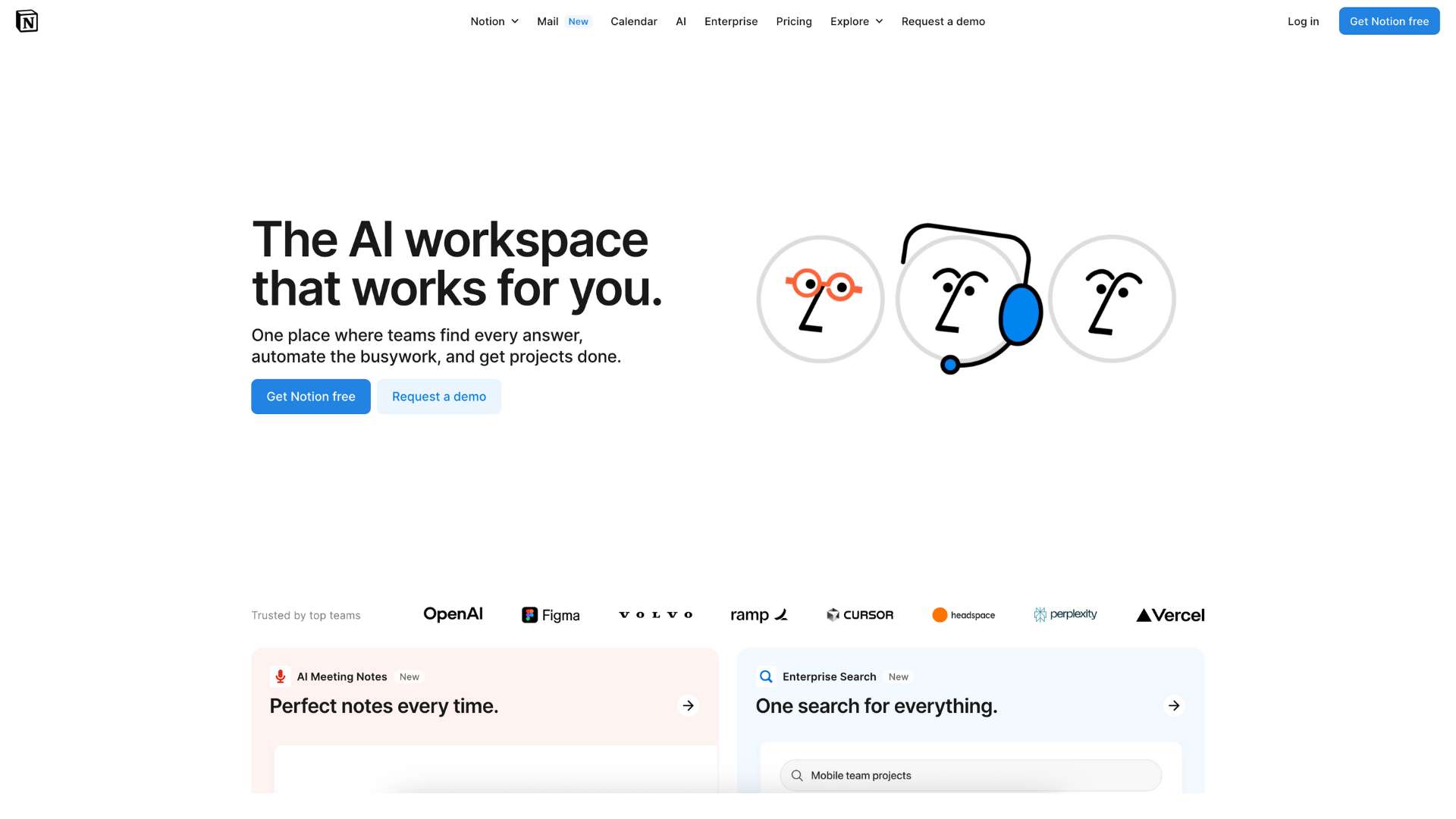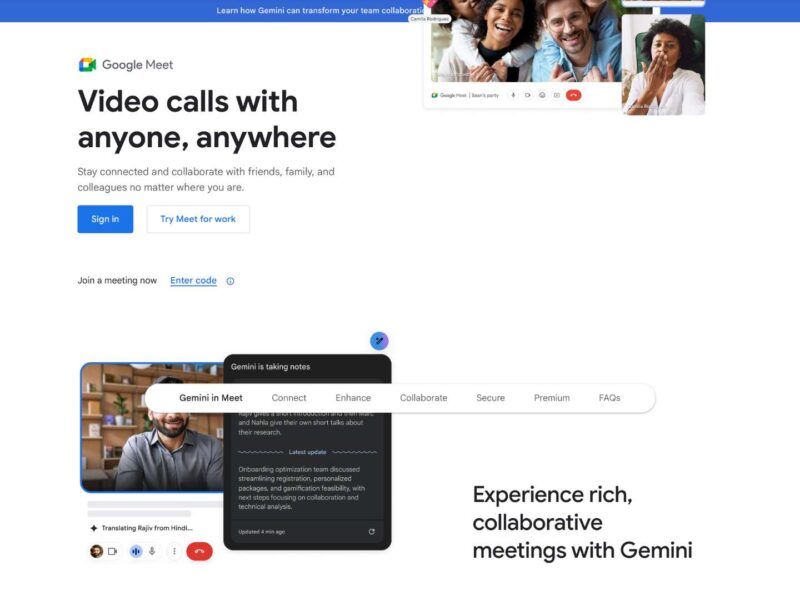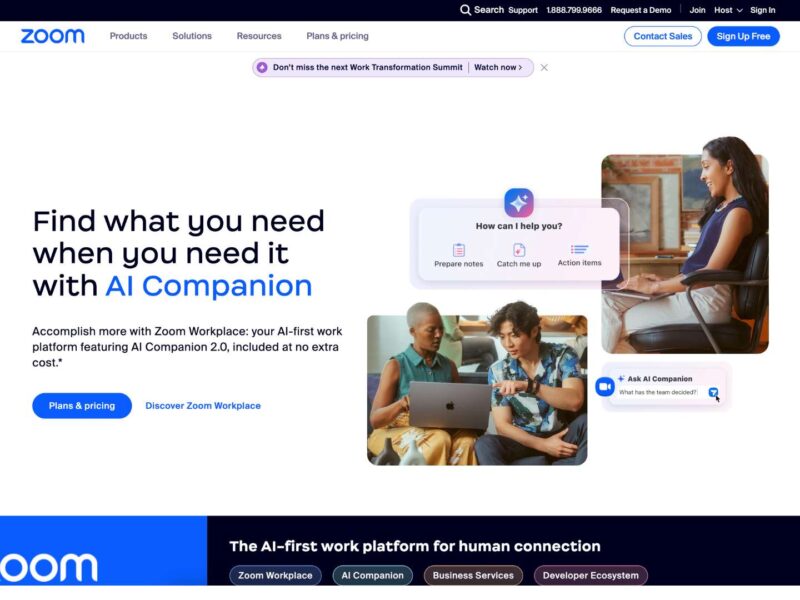Notion Review (2025): Features, Pricing, Pros & Cons
Notion has redefined the way teams and individuals approach productivity. Known for its flexibility, customizability, and sleek interface, Notion is an all-in-one workspace where you can write, plan, collaborate, and get organized.
Unlike traditional productivity tools that compartmentalize functions across different apps, Notion blends note-taking, task management, wikis, and databases into one cohesive platform.
As remote and hybrid work continue to dominate, Notion addresses a critical need: centralized digital organization.
Instead of switching between multiple apps like Google Docs, Trello, Evernote, and Airtable, users can build dynamic pages, link databases, assign tasks, and create entire workflows—all within Notion.
Who Notion Is For
Notion is ideal for:
- Solo entrepreneurs managing ideas, plans, and documentation
- Remote teams building collaborative wikis and task boards
- Creative professionals organizing portfolios, blogs, and content calendars
- Startups and SMBs managing project pipelines and databases
- Educational institutions and students structuring academic notes and schedules
Company Background
Notion Labs Inc. was founded in 2013 by Ivan Zhao and Simon Last, born out of a mission to improve software toolmaking and user interfaces. The company is headquartered in San Francisco, California, with additional offices in Dublin, Tokyo, and Hyderabad.
It gained popularity in 2018 when it opened up its powerful features to the public with a freemium model and saw explosive growth during the pandemic-era remote work boom.
As of 2025, Notion is valued at over $10 billion and continues to evolve rapidly. The company has expanded integrations, improved speed and offline capabilities, and introduced AI features to further enhance productivity.
Website: https://www.notion.so
Key Features
Notion’s greatest strength lies in its modular, block-based system. Everything in Notion—whether a paragraph, image, or table—is a “block” that can be moved, styled, or nested. Let’s break down its core features:
Note-Taking
- Rich Text Editor: Create beautifully formatted documents with support for headings, lists, code snippets, images, quotes, and more.
- Nested Pages: Organize notes within pages and sub-pages for a hierarchical knowledge base.
- Templates: Pre-built layouts for meeting notes, journals, class notes, blogs, and more.
Task & Project Management
- To-Do Lists and Checkboxes: Lightweight task tracking with progress indicators.
- Kanban Boards: Drag-and-drop board views to visualize tasks by status.
- Reminders and Due Dates: Add simple task scheduling for accountability.
- Assign Members: Allocate tasks to team members and track ownership.
Databases
- Relational Databases: Link multiple databases (e.g., Projects ↔ Clients) to create a fully relational system.
- Views: Switch between table, board, calendar, gallery, and timeline views.
- Filters and Sorting: Create dynamic views to customize how information is displayed.
- Custom Properties: Add text, select, multi-select, formulas, files, and more.
Wiki and Documentation
- Internal Knowledge Base: Build company wikis for SOPs, onboarding guides, and reference documents.
- Version History: Track edits and restore previous versions of any page.
- Permissions: Share with team members, guests, or the public; manage editing rights by page.
Collaboration
- Real-Time Editing: Work simultaneously with teammates, like Google Docs.
- Comments and Mentions: Inline feedback with @mentions for targeted collaboration.
- Teamspaces: Organize content and teams around departments or projects.
Integrations and Automation
- Notion API: Connect Notion with external apps like Zapier, Slack, GitHub, and Google Calendar.
- Native Integrations: Built-in connections with Figma, Loom, Miro, and more.
- Notion AI: Use built-in generative AI to summarize notes, auto-complete tasks, translate text, and brainstorm ideas.
Security and Administration
- Two-Factor Authentication (2FA): Added layer of account security.
- Granular Permissions: Set access levels from full admin to read-only viewers.
- Audit Logs (Enterprise): Monitor user activity for compliance.
- SSO & SCIM (Enterprise): Identity and user provisioning integrations for large organizations.
User Interface and Experience (UI/UX)
Notion is a minimalist’s dream. Its clean interface is designed to keep users focused and productive. You’re not bombarded by toolbars or pop-ups—just a blank canvas and the flexibility to build anything.
- Design: Sleek, distraction-free UI with smooth animations and easy drag-and-drop mechanics.
- Customization: Choose from icons, cover images, colors, and layout tweaks to personalize every page.
- Onboarding: Includes guided tutorials, templates, and starter kits for individuals, teams, and educators.
- Mobile Experience: Fully-featured apps for iOS and Android, with offline access and real-time sync.
- Accessibility: Screen reader support, keyboard shortcuts, dark mode, and upcoming accessibility improvements.
Platforms Supported
| Platform | Supported |
|---|---|
| Web Browser | Yes |
| Windows | Yes |
| macOS | Yes |
| Android | Yes |
| iOS | Yes |
| Offline Mode | Yes (Limited) |
While Notion is cloud-based, it offers offline access on desktop and mobile apps, though some features (like sync and AI) may be limited offline.
Pricing (2025)
| Plan | Monthly Cost/User | Key Features |
|---|---|---|
| Free | $0 | Unlimited pages and blocks, basic sharing, limited integrations |
| Plus | $10 | Unlimited file uploads, 30-day version history, sharing permissions |
| Business | $20 | SAML SSO, teamspaces, advanced analytics, and admin tools |
| Enterprise | Custom Pricing | Enterprise security, audit logs, compliance, customer success manager |
Free Trial: 14-day free trial available for Plus and Business plans. Students and educators can apply for free premium access via the Notion for Education program.
Pros and Cons
Pros
- Extremely Versatile: Can replace several apps—notes, task managers, wikis, and databases.
- Customizable Workflows: Users can build systems that match their exact needs.
- Powerful Collaboration Tools: Real-time editing and permissions make team collaboration smooth.
Cons
- Learning Curve: New users may feel overwhelmed by its open-ended structure.
- Performance Lag: Large pages or complex databases can slow down load times.
- Offline Limitations: Offline access exists but lacks parity with the online version in terms of speed and reliability.
Customer Support and Resources
| Resource | Availability |
|---|---|
| Help Center | 24/7 access to documentation and FAQs |
| Email Support | Available for all users; prioritized for paid accounts |
| Community Forum | Large and active global community |
| Notion Academy | Video courses and onboarding sessions |
| Webinars & Events | Frequent product demos, feature walkthroughs, and AMAs |
| In-App Help | Onboarding guides, feature tips, and AI-based suggestions |
Enterprise customers receive dedicated support, including success managers and implementation help.
Real-World Use Cases
- Tech Startups: Notion acts as an internal wiki, project tracker, product roadmap tool, and CRM—all in one.
- Content Creators: Bloggers and YouTubers use it for content calendars, research databases, and brand collaborations.
- Educators & Students: Teachers structure lesson plans, and students use it for revision notes and assignment tracking.
- Agencies: Manage client portfolios, briefs, campaign calendars, and performance tracking via customizable dashboards.
Each use case benefits from Notion’s flexibility, empowering users to tailor the tool to their exact process instead of conforming to rigid software structures.
User Reviews and Ratings
| Platform | Rating | Highlights |
|---|---|---|
| G2 | 4.7/5 | Praised for versatility and customization |
| Capterra | 4.6/5 | Loved by creatives and educators |
| Product Hunt | 5/5 | Frequent launches and feature updates |
| Trustpilot | 4.5/5 | Great for organization, but some note syncing issues |
User Quote (G2):
“Notion helped us consolidate four different tools into one. Our documentation, task tracking, and team updates now live in a single space.”
— Luis R., Head of Product
Best Alternatives
| Alternative | Best For | Comparison to Notion |
|---|---|---|
| Coda | Docs + Spreadsheets | More formula-centric, better for data-heavy workflows |
| ClickUp | Project Management | Includes more structured PM features like time tracking |
| Airtable | Databases & Tables | Stronger for data modeling and CSV imports |
| Obsidian | Personal Knowledge Mgmt | Better for local-first, Markdown-based note-taking |
| Confluence | Enterprise Wikis | Scales better for large corporate documentation |
Summary
Notion continues to be one of the most powerful and flexible productivity platforms in 2025. Its all-in-one structure removes the need for juggling between apps, allowing users to build customized workspaces tailored to their needs.
While it’s not without limitations—especially for offline users or those unfamiliar with modular software—its expansive feature set, attractive pricing, and ongoing improvements make it one of the best investments for modern teams, students, creatives, and businesses.
Explore Notion at notion.so, or visit usefully.site to compare it with other top-rated software tools.
Media
What is Notion?
How I Use Notion: Tutorial for Beginners


